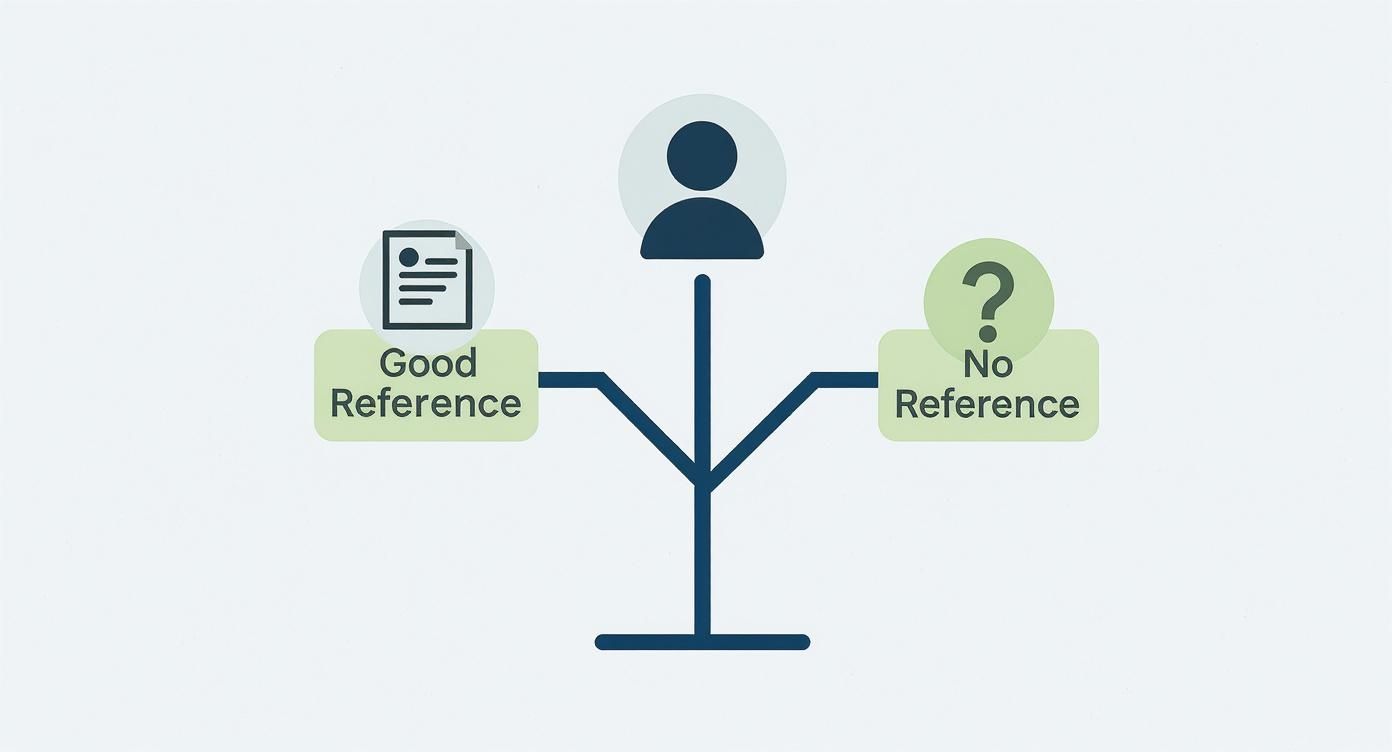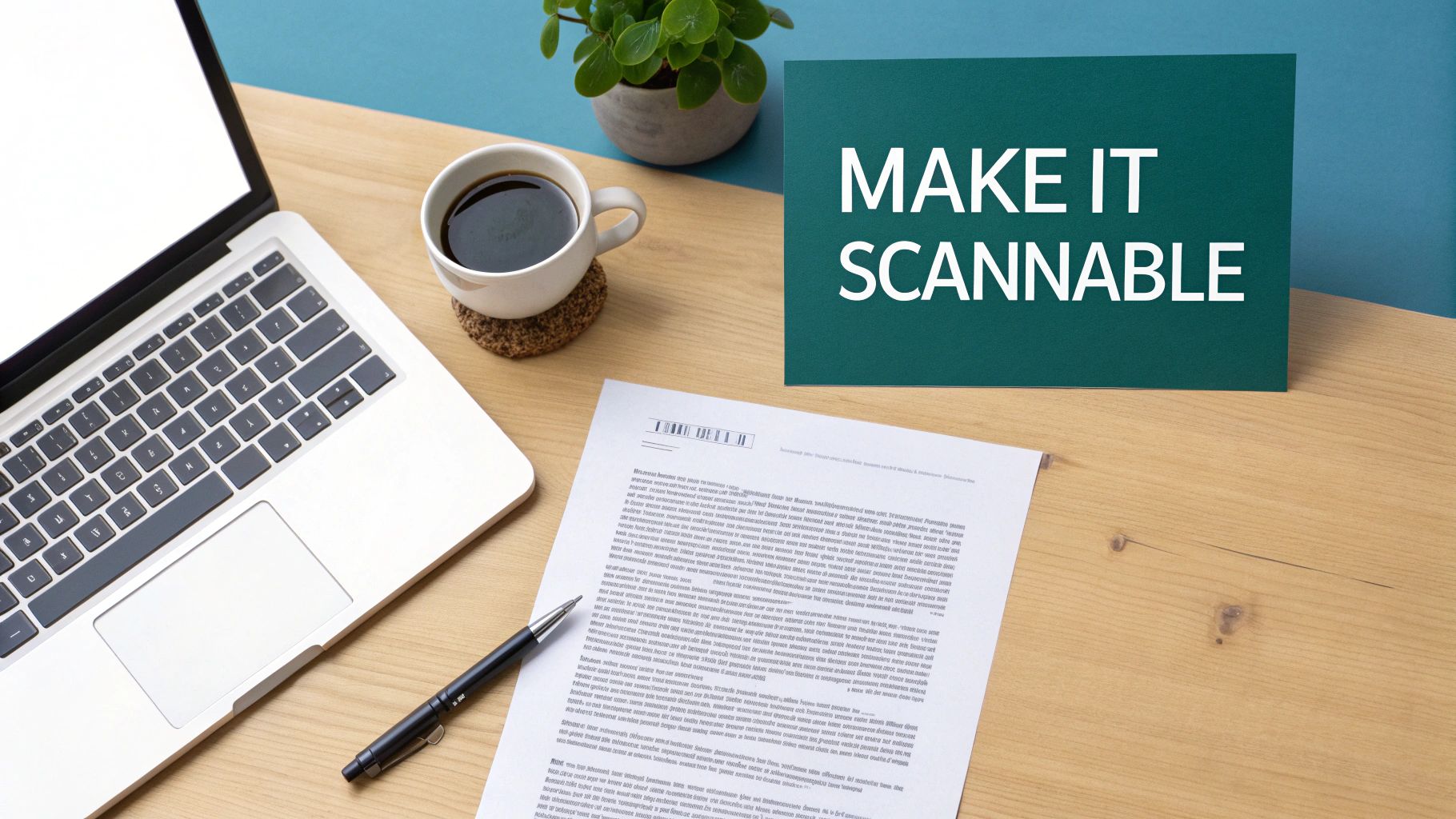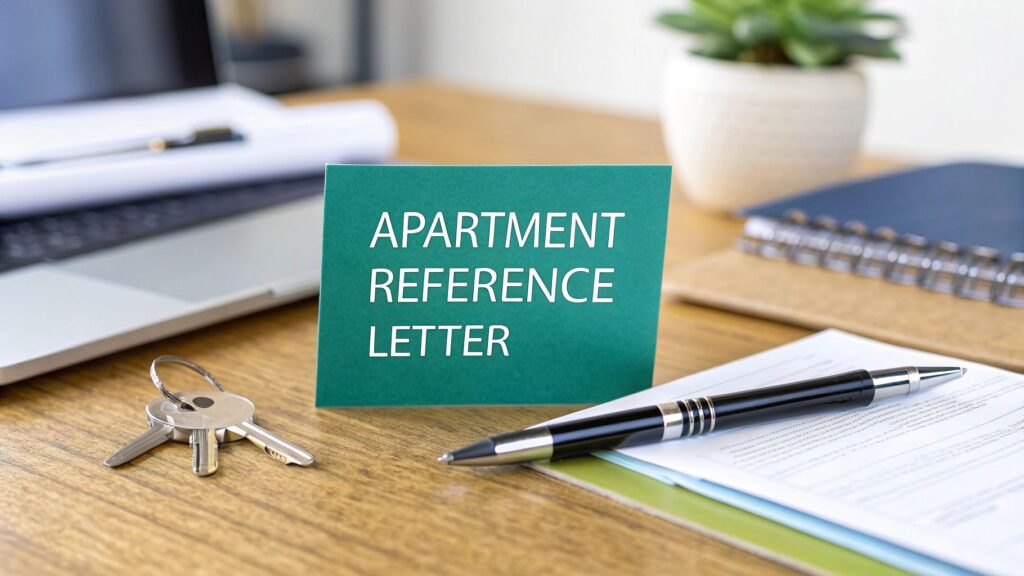An apartment reference letter is basically a formal thumbs-up from someone who can vouch for you as a reliable tenant. It’s a short, straightforward document from a previous landlord, a boss, or another credible person telling a property manager that you’re the kind of person who pays rent on time and won’t wreck the place. When things get competitive, a great letter can be the one thing that pushes your application to the top of the pile.
Why Your Reference Letter Is More Than Just a Formality
In a hot rental market, it's easy for your application to get buried. Think of an apartment reference letter as your secret weapon. It instantly elevates you from just another name on a list to a verified, low-risk candidate who a landlord can feel good about. It's your first impression, and it directly addresses a landlord's biggest worries: Will they pay on time, and will they take care of my property?
Put yourself in the property manager's shoes for a second. Their entire job revolves around finding tenants who are financially stable, keep the apartment in good shape, and don't cause trouble. A reference letter is third-party proof that you tick all those boxes. It cuts through the uncertainty and starts building trust before you even shake hands.
Building Trust Through Real-World Proof
A truly convincing letter doesn't just say you're a good tenant; it gives examples. Specific details, like a perfect record of on-time payments or a note about how you left your last apartment in pristine condition, are incredibly persuasive. This kind of proactive detail answers the landlord’s unspoken questions and shows you’re a responsible applicant. If you're just starting out, getting a handle on the whole rental journey is a smart move; you can learn more about the complete https://cynthiagardens.com/apartment-application-process/ in our detailed guide.
It’s not just anecdotal, either. In major US cities, over 70% of landlords rely on rental references to screen applicants and avoid the nightmare of property damage or missed payments. In tight housing markets, applicants with solid, verifiable letters can see their chances of getting approved jump by 30-50%. That stat alone shows this isn't a mere formality—it's a core part of a winning application strategy.
A strong reference letter isn’t just about proving you can pay rent. It’s about showing a landlord that you are a responsible community member who will treat their property with respect, making you a desirable long-term resident.
Beyond just getting your foot in the door, a standout letter paints a picture of you as the ideal resident—someone the landlord actually wants to keep around. This fits right in with what property managers are always focused on: strategies for effective tenant retention. By showing you’re reliable and respectful from day one, you’re not just signing a lease; you’re kicking off your new tenancy on the best possible note.
Choosing the Right Person to Write Your Letter
Picking someone to write your reference letter is a crucial move in the apartment hunting game. It's not just about finding someone who likes you; it's about choosing a person who can vouch for your reliability and character in a way a landlord will trust.
Sure, a glowing letter from a past landlord is the gold standard, but don't panic if you don't have one. The best referee is someone who can speak credibly about your responsibility. A direct supervisor who can confirm your steady income and professional attitude can be incredibly powerful, especially if you're a first-time renter.
Who Holds the Most Weight?
Landlords are looking for objective proof that you're a good bet. That's why references from people who know you in a professional or official capacity carry so much more weight than a kind word from your best friend or mom.
Here are the people you should have at the top of your list:
- Previous Landlords or Property Managers: This is your ace in the hole. They can give a firsthand account of you paying rent on time, keeping the place in good shape, and being a no-fuss tenant. Their opinion is almost always the most influential.
- Employers or Supervisors: A fantastic option, particularly for anyone without a rental history. A letter from your boss provides solid proof of employment, financial stability, and qualities like professionalism and accountability.
- Colleagues or Mentors: Someone you've worked closely with can speak to your reliability and integrity. This shows a landlord that you're a responsible person in all aspects of your life.
- Professors or Academic Advisors: If you're a student or recent grad, a professor can be a great reference. They can attest to your diligence and ability to meet deadlines, painting a picture of a responsible individual.
This decision tree gives you a quick visual on just how critical it is to lock down a strong reference.

As the infographic makes clear, having a credible referee puts you on a direct path to approval. Coming up empty-handed just adds a layer of uncertainty that can sink your application.
Comparing Different Types of Referees
Choosing the right person can feel tricky. This table breaks down who can say what, helping you match the best person to your specific situation.
| Referee Type | What They Can Attest To | Best For | Potential Drawback |
|---|---|---|---|
| Previous Landlord | Timely rent payments, property care, lease adherence, quiet tenancy. | Virtually all applicants; the "gold standard." | May be hard to reach or unwilling if the tenancy ended poorly. |
| Employer/Supervisor | Financial stability, professionalism, reliability, character. | First-time renters or those with gaps in rental history. | Cannot speak directly to your behavior as a tenant. |
| Colleague | Punctuality, responsibility, collaborative nature, personal integrity. | Applicants who need to supplement a primary reference. | Seen as less objective than a direct supervisor or landlord. |
| Professor/Advisor | Diligence, meeting deadlines, responsibility, personal character. | Students or recent graduates with no professional or rental history. | Their recommendation is based on academic, not real-world, performance. |
Ultimately, you want to pick the person who can provide the most relevant, positive, and credible information for a prospective landlord.
The Right Way to Ask for a Reference
How you ask is almost as important as who you ask. A rushed, sloppy request can result in a weak, generic letter—or worse, a "no." A thoughtful approach, on the other hand, makes it easy for them to say yes and write something that truly helps you.
First rule: give them a heads-up. At least one to two weeks' notice is a good rule of thumb. It shows you respect their time and gives them a chance to write a proper letter without feeling rushed off their feet.
When you do ask, make their job as easy as possible. Pull everything they need into one neat email or document so they aren't chasing you for information.
Pro Tip: Offer to send over a draft or a few bullet points about your rental history. This isn't about putting words in their mouth. It’s about giving them a helpful cheat sheet with specifics like, "paid rent on time for 24 consecutive months" or "left the unit in pristine condition."
Here’s what your "ask package" should include:
- The name and address of the landlord or property management company.
- A quick description of the apartment or a link to the rental listing.
- The deadline for when the letter is due.
- A few key reminders about your tenancy or work performance.
By making it a breeze for them, you're setting your referee up to write the best possible apartment reference letter, which in turn gives your application a serious competitive edge.
Crafting a Letter That Landlords Actually Read

Let's be realistic: a busy property manager is drowning in applications. They don't have time to read a novel about how great you are. Your reference letter has seconds to make an impression, so it needs to be scannable, persuasive, and incredibly easy to digest.
A giant wall of text is a one-way ticket to the "no" pile. What you need is a well-structured letter that immediately highlights why you're a safe bet. Think of it as a clear roadmap that guides the landlord from "who are you?" to "when can you move in?" without any unnecessary detours.
The goal isn't just to say you're a good tenant; it's to prove it. Vague compliments are nice, but they're completely forgettable. Concrete facts, on the other hand, stick.
The Anatomy of an Impactful Letter
A truly effective letter has a natural flow. It starts by quickly establishing who is writing and why their opinion matters, then dives into the specific details that landlords are actually looking for. Forget the fluff—this is all about clarity and credibility.
Here’s a simple breakdown that works every time:
- A Crystal-Clear Introduction: Get straight to the point. The opening line should state the writer's name, their relationship to you (e.g., "I was Jane's landlord at 123 Main St."), and how long they've known you. This builds instant trust.
- Body Paragraphs with Proof: This is where you make your case. Each short paragraph should focus on a key quality—like financial responsibility or how you cared for the property—and back it up with a real example.
- A Strong Closing Recommendation: End with confidence. A direct, powerful sentence summarizing why you'd be a fantastic tenant leaves a lasting, positive impression.
- Essential Contact Information: This is non-negotiable. The letter must include the writer's phone number and email. A reference without verifiable contact info looks suspicious and might as well be ignored.
This structure works because even a landlord who's just skimming will catch the crucial information: who wrote it, why they're qualified to comment, and the specific reasons you’re a low-risk applicant.
Turning Vague Praise into Hard Evidence
The single biggest mistake I see in reference letters is relying on empty, generic phrases. "She was a great tenant" means absolutely nothing to a property manager. To make an impact, you have to swap those weak statements for specific, powerful examples.
Instead of just saying you're "responsible," show it. Did you always pay rent a few days early? Say that. Did you leave the apartment so clean that the landlord didn't need to hire professionals? Put that in the letter.
Key Takeaway: The difference between a good letter and a great one is in the details. Specifics like "paid rent five days early each month for two years" are infinitely more persuasive than a generic line about being a "good tenant."
Here’s how you can reframe common clichés into something a landlord will actually remember:
| Instead of This (Vague) | Try This (Specific & Powerful) |
|---|---|
| "They were a responsible tenant." | "They paid their rent on or before the 1st of every month for 36 consecutive months." |
| "They took good care of the property." | "They left the unit in immaculate condition, requiring no repairs or deep cleaning." |
| "They were quiet and respectful." | "We never received a single noise complaint from neighbors during their entire tenancy." |
This simple shift from telling to showing is what makes an apartment reference letter stand out from the stack. It gives the landlord the cold, hard proof they need to feel confident in choosing you.
Including The Details That Matter Most

A well-structured letter is a great start, but what really makes a difference are the details packed inside. Landlords aren’t just looking for a vague thumbs-up; they need hard facts to feel confident about handing over the keys. Getting these specifics right is what elevates a decent letter to a truly persuasive one.
Put yourself in the landlord's shoes for a moment. They're trying to assess risk, and they're doing it quickly. Your reference letter should anticipate their biggest questions about your reliability, financial stability, and how you’ll treat their property.
The Non-Negotiable Information
Every solid apartment reference letter has to hit a few key points. If these are missing, the letter just doesn't carry the same weight. Make sure your reference includes these fundamentals, as they’re the bedrock of a recommendation a landlord can trust.
- Precise Tenancy Dates: The letter should state the exact start and end dates of the lease (for example, "from March 1, 2022, to February 28, 2024"). This provides a clear, verifiable timeline.
- A Perfect Payment History: This might be the single most important detail. A simple sentence like, "rent was paid in full and on time every month," is music to a landlord’s ears because it addresses their biggest financial concern head-on.
- Confirmation of Lease Compliance: A quick mention that you followed all the rules of the lease—like policies on pets, noise, or guests—is incredibly reassuring.
- Property Condition at Move-Out: How you left the place speaks volumes. A comment such as, "the unit was left in excellent condition, and the full security deposit was returned," is a massive green flag for any property owner.
To make your letter even more effective, it helps to understand how property managers screen for ideal tenants. Knowing their criteria helps you ensure your reference ticks all the right boxes.
Addressing Potential Red Flags
Let's be real—life happens, and not every rental history is flawless. The trick is to tackle any potential issues directly and honestly in the letter, rather than crossing your fingers and hoping the landlord doesn't find out.
For example, if you had a short tenancy, your reference can frame it positively. Something like, "Although their tenancy was brief due to a job relocation, they were an exemplary tenant for the entire six-month period," adds crucial context and highlights your reliability.
Pro Tip: If a past problem was caused by a roommate, the reference can set the record straight. A landlord might write, "Any issues were related to a former roommate, and [Your Name] handled the situation maturely and responsibly."
This kind of proactive clarification turns a potential negative into a positive, showcasing your character and problem-solving skills. While a glowing reference goes a long way, your finances are also a major factor. You can learn more about what makes a good https://cynthiagardens.com/credit-score-for-apartment-rental/ in our other guide.
Just how much these letters matter can depend on where you are in the world. In many European rental markets, they are absolutely essential. For instance, in sought-after Italian resort towns, landlords often require formal letters to build trust, especially with international renters. Some estimates suggest that a staggering 60% to 70% of rental agreements in these areas hinge on a strong reference. This global view really underscores how seriously landlords can take these documents.
Putting It All on Paper: Real-World Examples You Can Use

It's one thing to talk about what makes a great reference letter, but it's another to see it in action. To make this as easy as possible, I've put together three examples based on the most common situations renters find themselves in.
Think of these less as rigid templates and more as a strong starting point. Notice how each one is tailored to highlight the applicant's best qualities from the perspective of a property manager. You can adapt the tone and details to fit your own story perfectly.
The Gold Standard: A Letter from Your Previous Landlord
This is the one every property manager wants to see. It’s a direct, third-party confirmation that you are a responsible tenant. It cuts right to the chase and addresses all the major concerns: payments, property care, and neighborly conduct.
To Whom It May Concern,
This letter is a professional recommendation for Maria Rodriguez, who was my tenant at 456 Oak Avenue, Apt. 2B, from June 1, 2021, to May 31, 2024.
During her three-year tenancy, Maria was an exemplary resident. Her rent was paid on or before the first of every month without fail, and we never received a single noise complaint from her neighbors.
Maria took excellent care of the property and left the unit in pristine condition upon moving out, requiring no repairs beyond standard turnover cleaning. Her full security deposit was returned.
I highly recommend Maria as a tenant and would gladly rent to her again.
Sincerely,
Robert Chen
(555) 123-4567
The First-Timer's Ace: A Letter from an Employer
Don't have a rental history? No problem. A glowing reference from your employer is an incredibly powerful tool. It speaks directly to your financial stability and personal responsibility—two huge green flags for any landlord.
This approach is perfect for recent graduates or young professionals tackling their first apartment rental applications.
Here's how to structure it:
- Open with confidence: "I am writing to recommend David Smith for his apartment application. As his direct supervisor at Acme Corp for the past two years, I can attest to his reliability and character."
- Highlight key traits: "David is a valued member of our team, known for his punctuality and strong work ethic. He holds a full-time position with a stable income, and I am confident in his ability to meet his financial obligations."
- Close with a strong endorsement: "Based on his professionalism and responsible nature, I believe David would make a fantastic tenant. Please feel free to contact me with any questions."
The Character Witness: A Letter from a Personal Contact
Sometimes, you don't have a recent landlord or an employer who can write a letter. In this case, turning to a respected personal contact—like a mentor, professor, or long-time family friend—is a smart move.
The focus here shifts from rental history to personal integrity. The goal is to paint a picture of someone who is trustworthy, clean, and respectful of others. Your reference should explain how they know you and, if possible, share a quick story that shows you're a responsible person. That kind of personal vouching can go a long way in proving you'll be a great tenant.
Got Questions About Reference Letters? Let's Get Them Answered
Rental applications can feel like a maze, and when it comes to reference letters, it's easy to get turned around. Let's tackle some of the most common questions and concerns so you can move forward with confidence.
What If I’m a First-Time Renter?
This is probably the number one question I hear. If you've never rented before, you obviously don't have a previous landlord to ask for a reference. Don't sweat it—landlords and property managers see this all the time. Everyone has to start somewhere.
Your best bet is to think about who else can vouch for your reliability. An employer is a fantastic choice. They can speak to your steady income and your responsible nature, which are exactly the traits a landlord is looking for.
Who Else Can I Ask?
What if you're a recent graduate or maybe you've been out of the workforce for a bit? No problem. You still have great options.
- Professors or Mentors: These individuals can attest to your character, your ability to meet deadlines, and your overall sense of responsibility.
- Personal Contacts: Think about a long-time family friend, a coach, or a mentor who has known you for years. They can provide a character reference that speaks to your trustworthiness.
The main goal is to show you're a dependable person, even if you don't have a traditional rental history to back it up.
Expert Tip: Keep it short and sweet. The most effective reference letters are concise, usually just three or four short paragraphs that fit neatly on one page. Landlords are busy people; they appreciate a letter that gets right to the point.
What are the Biggest Mistakes to Avoid?
A few common missteps can easily sink an otherwise solid application. The most frequent one is being too vague. A line like "they were a good tenant" doesn't really say anything.
Instead, get specific. Something like, "they paid their rent on time, without fail, for 24 consecutive months" provides concrete, verifiable proof.
Also, make absolutely sure your referee includes their current contact information (phone number and email). A reference a landlord can't verify is basically useless. And finally, give it a quick proofread. A letter free of typos and grammar mistakes makes both you and your reference look professional, boosting your chances of getting that approval.
Ready to find your perfect home in Boca Raton? At Cynthia Gardens, we offer serene, spacious one-bedroom apartments ideal for students and professionals. Check out our available units and start your application today.
